The Allahabad High Court has ruled that a conviction recorded against a person while he was a juvenile cannot be treated as a disqualification for public employment. The court said Section 19 of the Juvenile Justice (Care and Protection of Children) Act, 2000, expressly bars such disqualification.
A Division Bench comprising Chief Justice Arun Bhansali and Justice Kshitij Shailendra delivered the judgment while allowing the petition filed by Pundarikaksh, a teacher whose services had been terminated by Jawahar Navodaya Vidyalaya, Gauriganj, Amethi, over allegations that he had concealed his past criminal history.
The petitioner had applied for the post of postgraduate teacher in 2019 and, after successfully clearing the selection process, was issued an appointment letter. However, two months after joining, a complaint was lodged alleging that he had hidden details of a past criminal case. Following an inquiry, his appointment was cancelled, and he was dismissed from service.
He challenged the termination before the Central Administrative Tribunal (CAT), Allahabad, which directed the authorities to conduct a fresh inquiry as per the Supreme Court’s ruling in Avtar Singh vs Union of India and Others. The matter eventually reached the High Court after both parties contested the CAT order.
The bench examined Section 19(1) of the Juvenile Justice Act and observed:
“A bare perusal of Section 19(1) of the Act makes it clear that it starts with a non-obstante clause excluding the applicability of any other law in the matter of a juvenile and clearly provides that a juvenile who has committed an offence and has been dealt with under the provisions of the Act shall not suffer disqualification attaching to a conviction of an offence under such law.”
The judges emphasised that the legislative intent behind Section 19 was to ensure that a child in conflict with law is given a chance to reform and should not face lifelong consequences for offences committed during childhood.
Allowing the petition, the court set aside the action taken against the petitioner and upheld the CAT’s October 16 order. The ruling reinforces the rehabilitative spirit of the Juvenile Justice Act, affirming that no stigma or disqualification can follow a juvenile once he has been dealt with under the Act.




